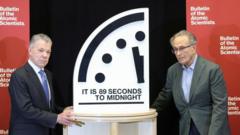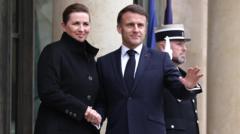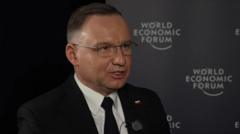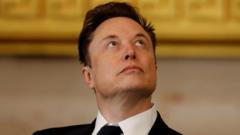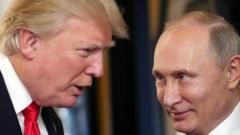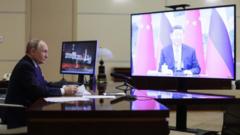The investigation follows allegations of a coordinated campaign supporting a far-right candidate, raising concerns about the platform's advertising practices.
EU Launches Investigation into TikTok's Potential Role in Romanian Election Manipulation

EU Launches Investigation into TikTok's Potential Role in Romanian Election Manipulation
The European Commission scrutinizes TikTok for potential foreign influence in Romania's presidential elections.
In a significant move, the European Union's executive branch has initiated a formal investigation into TikTok amid serious allegations of foreign interference in Romania's presidential elections. The inquiry focuses on concerns that the popular video-sharing app was used to manipulate public opinion during the recent electoral process, particularly through a surge of newly activated accounts.
This investigation came to light following the cancellation of the second-round vote earlier this month, after intelligence reports indicated that around 25,000 TikTok accounts were activated in the weeks leading up to the first voting round. These accounts promoted Călin Georgescu, a relatively obscure far-right independent candidate, who has made controversial remarks praising Russian President Vladimir Putin while claiming not to be a supporter.
European Commission President Ursula von der Leyen emphasized the importance of safeguarding democracies from foreign interference, stating, "Whenever we suspect such interference, especially during elections, we must act swiftly and firmly." The EU’s scrutiny will include a review of TikTok's advertising policies and its content recommendation algorithms to determine whether they violate the Digital Services Act (DSA), aimed at curbing disinformation and fostering safe online environments.
Georgescu's campaign reportedly leaned heavily on TikTok for promotion, raising alarms despite Russia's denial of involvement. Romanian intelligence has categorized the nation as a priority target for Russian interests, suggesting ulterior motives in the election campaign. Notably, TikToks supporting Georgescu did not adhere to legal requirements for being distinctly marked as election content in Romania. Reports indicate that one account allegedly spent $381,000 on promoting Georgescu's content, which he denied funding personally.
TikTok, for its part, has denied any misconduct, asserting that the treatment of Georgescu's account was consistent with their policy across the board. Their response to accusations involved immediate action taken on flagged videos, devoid of proper election content identifiers, within 24 hours after being contacted by Romanian authorities.
As part of this ongoing investigation, the EU plans to assess the risk posed by TikTok's algorithm and how it might facilitate the "automated exploitation" of user engagement. This inquiry is particularly critical as it encompasses potential risks for upcoming national elections scheduled within the EU from 24 November 2024 to 31 March 2025, including those in Romania, Ireland, and Croatia.
With the EU's commitment to thoroughly investigating TikTok's conduct, this situation aligns with a concurrent investigation regarding the platform's adherence to the DSA concerning harmful content and minors’ protection. The implications of these findings could foster broader scrutiny of social media platforms and their roles in shaping political discourse across Europe.


